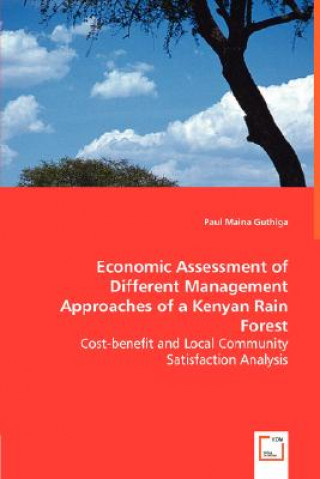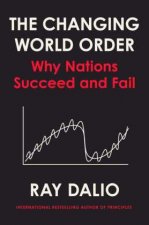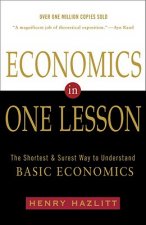
Code: 06949692
Economic Assessment of Different Management Approaches of a Kenyan Rain Forest
by Paul M. Guthiga
Forest conservation, as an economic undertaking, involves use of resources (costs) as well as generation and distribution of benefits. These resources ought to be allocated so as to generate maximum net benefits for society. In ad ... more
- Language:
 English
English - Binding: Paperback
- Number of pages: 188
Publisher: VDM Verlag Dr. Mueller E.K., 2008
- More about this

You might also like
-

Poems
16.82 € -18 % -

Best Practices in Supplier Relationship Management and Their Early Implementation in the Air Force Material Command
23.97 € -

For Love or Honor Bound
20.14 € -18 % -

Religious Education
200.29 € -

Ottimizzazione Aerodinamica Della Deriva Di Una Barca a Vela
62.26 € -

Sars
56.21 € -

TRIZ - Lösungsfindung ohne Kompromisse
68 € -5 %
Give this book as a present today
- Order book and choose Gift Order.
- We will send you book gift voucher at once. You can give it out to anyone.
- Book will be send to donee, nothing more to care about.
More about Economic Assessment of Different Management Approaches of a Kenyan Rain Forest
You get 189 loyalty points
 Book synopsis
Book synopsis
Forest conservation, as an economic undertaking, involves use of resources (costs) as well as generation and distribution of benefits. These resources ought to be allocated so as to generate maximum net benefits for society. In addition, costs and benefits ought to be distributed equitably among stakeholders. Support of communities living adjacent to tropical forests is critical for success of conservation efforts, but often their views are ignored in conservation decisions. Kakamega forest, a tropical rainforest in Kenya is divided into three different parts each under a distinct management approach. This study applied cost-benefit analysis to analyze and compare economic efficiency of the three management approaches. Further, the study applied the concept of consumer satisfaction to analyze local community satisfaction levels with three management approaches. The results indicate that from a global point of view, the three management approaches are economically efficient. But, at the local and national level, the opportunity costs of conservation outweigh the benefits. Local communities ranked the protectionist approach highest overall. The result of this work provides forest managers, policy makers and other stakeholders with interest in tropical forest conservation with information they need to make important conservation decisions. Forest conservation, as an economic undertaking, involves use of resources (costs) as well as generation and distribution of benefits. These resources ought to be allocated so as to generate maximum net benefits for society. In addition, costs and benefits ought to be distributed equitably among stakeholders. Support of communities living adjacent to tropical forests is critical for success of conservation efforts, but often their views are ignored in conservation decisions. Kakamega forest, a tropical rainforest in Kenya is divided into three different parts each under a distinct management approach. This study applied cost-benefit analysis to analyze and compare economic efficiency of the three management approaches. Further, the study applied the concept of consumer satisfaction to analyze local community satisfaction levels with three management approaches. The results indicate that from a global point of view, the three management approaches are economically efficient. But, at the local and national level, the opportunity costs of conservation outweigh the benefits. Local communities ranked the protectionist approach highest overall.
 Book details
Book details
Book category Books in English Economics, finance, business & management Economics
75.36 €
- Full title: Economic Assessment of Different Management Approaches of a Kenyan Rain Forest
- Subtitle: Cost-benefit and Local Community Satisfaction Analysis
- Author: Paul M. Guthiga
- Language:
 English
English - Binding: Paperback
- Number of pages: 188
- EAN: 9783836492324
- ISBN: 3836492326
- ID: 06949692
- Publisher: VDM Verlag Dr. Mueller E.K.
- Weight: 259 g
- Dimensions: 229 × 152 × 10 mm
- Date of publishing: 07. April 2008
Trending among others
-

Principles for Dealing with the Changing World Order
24.27 € -4 % -

Why Nations Fail
11.78 € -29 % -

Pyramid Principle, The
51.17 € -

Misbehaving - The Making of Behavioral Economics
10.57 € -10 % -

Phishing for Phools
16.41 € -17 % -

Rational Optimist
13.59 € -

Human Action
37.98 € -

Dollars and Sex
21.45 € -17 % -

Freakonomics
7.95 € -20 % -

Irrational Exuberance
20.34 € -6 % -

Team Topologies
23.87 € -10 % -

Economics In One Lesson
14.60 € -27 % -

Predictably Irrational
15 € -15 % -

ITIL4 A POCKET GUIDE
23.57 € -

Art of Statistics
10.87 € -23 % -

Business Model Navigator, The
25.68 € -16 % -

Liar's Poker
13.59 € -

Start-Up Nation
9.06 € -29 % -

Economic Facts and Fallacies
16.51 € -21 % -

Think Like a Freak
7.45 € -25 % -

Breakthrough Copywriter
16.82 € -1 % -

Economics: The User's Guide
12.79 € -23 % -

Currency Wars
15.81 € -12 % -

Misbehavior of Markets
22.26 € -

Debt, 10th Anniversary Edition
25.68 € -28 % -

Complete Guide to Starting a Paintless Dent Repair Business
36.26 € -

Delicate Art of Bureaucracy
20.44 € -23 % -

Fatal Conceit (Paper)
18.53 € -19 % -

HR Change Toolkit
17.42 € -16 % -

Economist Guide To Analysing Companies 6th edition
17.32 € -27 % -

most important thing
20.85 € -

NO LOGO 10THANN ED
20.04 € -19 % -

Organizational Design
55.91 € -

JD Story
25.18 € -28 % -

Family Office
35.86 € -14 % -

Manias, Panics and Crashes
29.51 € -

No B.S. Sales Success in the New Economy
13.09 € -16 % -

How I Made One Million Dollars Last Year Trading Commodities
38.98 € -22 % -

Price of Inequality
9.56 € -19 % -

Essential Mathematics for Economic Analysis
81 € -

Leading at a Higher Level
28.71 € -9 % -

(Mis)Behaviour of Markets
13.29 € -28 % -

Freakonomics
5.93 € -30 % -

The Invisible Hand
7.24 € -28 % -

Economics 101
15.10 € -18 % -

Hypomanic Edge
19.94 € -16 % -

Fed Up
25.58 € -16 % -

New World Economy: A Beginner's Guide
14.60 € -23 % -

Economics Book
21.05 € -17 %
Collection points Bratislava a 2642 dalších
Copyright ©2008-24 najlacnejsie-knihy.sk All rights reservedPrivacyCookies



 15549 collection points
15549 collection points Delivery 2.99 €
Delivery 2.99 € 02/210 210 99 (8-15.30h)
02/210 210 99 (8-15.30h)